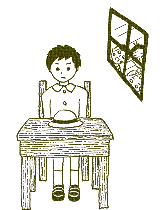
Japanese
Matasaburou of the Wind

|
Japanese Matasaburou of the Wind |
 |
Saburou Takada, Matasaburo, and the village children |
Because of his father's work in a mining company, Saburou Takada transfers to a very small school, located along the bank of a mountain stream. The school has only one classroom and all the children from grades one to six study together in it. Saburou wears refined city clothes and his demeanor is polished and proper. To the eyes of the village children he seems like someone from a foreign land. The children, especially Kasuke, a fourth grader, sense that Saburou might be Matasaburou, the wind sprite. This story covers the ten days that Saburou attended this country school. It depicts the delicate relationship, built upon a mixture of a variety of emotions, between the village children and Saburou during that time. |
| A strange child on the day after summer vcation | On the morning of September 1, the day after summer vacation had ended, the children arrive at school and are surprised to see an unfamiliar child sitting in a seat at the very front of the classroom.  This child has reddish hair and wears an over-sized dark gray jacket. His short pants are white and his shoes are of reddish leather. The village children ask him to come outside, but he gives no reply and remains seated very properly. This causes the children to speculate about him, saying, "I think he's a foreigner." This child has reddish hair and wears an over-sized dark gray jacket. His short pants are white and his shoes are of reddish leather. The village children ask him to come outside, but he gives no reply and remains seated very properly. This causes the children to speculate about him, saying, "I think he's a foreigner.""Just at that moment, a strong gust of wind blows very suddenly, rattling all the glass doors. The mountain, grass and chestnut trees behind the school all turn strangely pale and shudder." Then Kasuke exclaims, "Oh! I've got it! He's Matasaburou of the wind!" In the children's minds Saburou Takada, the transfer student whom they feel is from a foreign land, and the wind sprite, who brings the winds from afar and evokes feelings of fear and admiration, are linked. From the following day, the relationship between the village children and Saburou becomes an intricate blend of a variety of elements. On September 5, Kousuke invites Kasuke to come with him to a place where he has found some grape bushes. Kasuke asks Saburou and some other children to join him, and they all leave together. |
|
| A tobacco leaf supervised by the Monopoly Bureau | Along the way they come across a field of tobacco plants, and Saburou asks, "Hey, what are these leaves anyway?" Then, he picks a tobacco leaf. The Monopoly Bureau supervises tobacco harvests very strictly, and so Ichirou tells Saburou, "You're really going to be scolded by the Monopoly Bureau, you know." Saburou's face turns red and he says angrily, "I didn't know that when I picked it!" |
|
| Kousuke reproaches Saburou | Kousuke, who is not happy about having Saburou and the others come along to the grape bushes he has found, berates Saburou and tells him to put the leaf back the way it was. Saburou doesn't know what to do and places the leaf at the base of a tree and leaves. Two days later, after classes are over, Kasuke asks Saburou to go with him to a river close by, where the other children have gone to play, and so off they go. |
|
The children guard Saburou |
By and by a man wearing western-style clothing and carrying a walking stick comes along. The children see him disturbing the water in their fish preserve with his stick. This man works for the Monopoly Bureau, and so the children are nervous, wondering if he has discovered that Saburou picked one of the tobacco leaves. In the tree Ichirou tells the others, "All of you, encircle Matasaburou," and tries to hide Saburou. The man wades back and forth in the shallow water as though to wash his dirty leggings. Ichirou leads the children in shouting at the man, "Don't make the river muddy! Isn't that what our teacher always tells us." This succeeds in making the man leave In this scene, Ichirou, a sixth grader, takes the lead in protecting Saburou, who doesn't understand the situation. |
|
| Saburou has left away | On the morning of September 12, Ichirou awakes in surprise from dreaming about the song that Matasaburou sings.
Blow away the green chestnuts too; Blow away the sour quince too; Doddo-do, dodoudo, dodoudo, dodou...." |